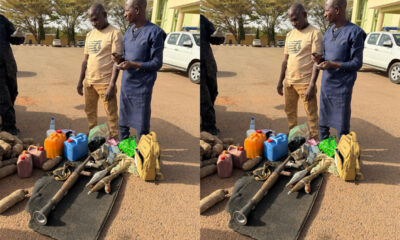Business
Tinubu advisory council wants Customs, NIMASA, FIRS merged, illegal refineries formalised

Tinubu advisory council wants Customs, NIMASA, FIRS merged, illegal refineries formalised
The Nigeria Customs Service, the Nigerian Maritime Administration and Safety Agency, NIMASA and the Federal Inland Revenue Service, FIRS may soon be merged.
This was the recommendation forwarded to President Bola Tinubu by his Policy Advisory Council.
The recommendation is contained in the report submitted by the advisory council on Friday.
The council proposed the merger in order to enable an efficient collection of all direct and indirect taxes, as well as levies on behalf of the Federal Government.
The council outlined the removal of fuel subsidy, sale or concession of select government assets, transition to a transparent and unified foreign exchange rate system, deepening tax collection and optimization of operating expenditure to reduce cost as urgent tasks to be pursued by the President within the first 100 days in office.
Members of the Policy Advisory Council are Senator Tokunbo Abiru (chair), Dr Yemi Cardoso, Sumaila Zubairu and Dr Doris Anite.
The report partly read, “Passage of an Emergency Economic Reform Bill to grant the President special powers to drive the economic reform agenda to declare a state of emergency in revenue generation and national security.
“Transform FIRS, Customs, NIMASA, etc into the Nigerian Revenue Service to collect all direct and indirect taxes and levies on behalf of the Federal Government.
“Reform the Central Bank of Nigeria, implement civil service reform/ Oronsaye Report.
“Make interim leadership appointments (to be ratified later by the National Assembly) and make temporary increases in fiscal circuit-breakers, e.g.debt limits, later ratified by the National Assembly.”
The council’s report, which focuses on fiscal and monetary policies, industry, trade and capital market reforms, emphasised that changes in the Central Bank of Nigeria and temporary increases in fiscal circuit breakers such as debt limits would help achieve N1tn Gross Domestic Product growth and over 50 million jobs for citizens in eight years.
The 90-page document further proposed that reforms in the CBN will help achieve about $50bn-$60bn in external reserves, with a monthly inflow of at least $6bn-$8bn from export earnings and other forms of capital inflow, to support the policy at an exchange rate of N500-N600/$.
On fiscal policies to be implemented, the council advised on the need to achieve a domestic refining capacity of two million barrels per day, while creating economic opportunity for the host communities.
They also proposed one-off Personal Income Tax reliefs for low-income earners for up to one year as non-cash palliatives to cushion the effect of fuel subsidy removal.
Part of the report read, “Ramp up production capacity to four million barrels from offshore and onshore assets within four years and grow crude oil revenue and savings into ECA and NSIA.
“Formalise illegal refineries and encourage modular refineries to create economic opportunity for the host communities.
“Aggressively grow domestic refining capacity to 2 million barrels per day in the next 8 years, including modular refineries.”
Business
TCAN Targets Logistics Reforms to Drive Economic Growth at 2026 Transport Summit

TCAN Targets Logistics Reforms to Drive Economic Growth at 2026 Transport Summit
The Transportation Correspondents Association of Nigeria (TCAN) has begun preparations for its 2026 Annual Transport Summit, placing Nigeria’s logistics value chain at the centre of national economic discourse.
Scheduled for September 2026 in Lagos, the summit will be held under the theme, “Unlocking Economic Growth Through Transportation Logistics.”
It is expected to draw major stakeholders across the aviation, maritime, rail and road transport sectors, alongside logistics service providers, policymakers, regulators, development partners and financial institutions.
In a statement, TCAN said the summit would critically examine how efficient transportation logistics can serve as a catalyst for sustainable economic growth, trade facilitation, job creation and regional integration, especially in the context of ongoing reforms and infrastructure investments within the sector.
Chairman of TCAN, Tola Adenubi, described transportation logistics as the backbone of economic development, stressing that the performance of Nigeria’s logistics ecosystem directly impacts the nation’s competitiveness.
“From cargo handling at airports and seaports to inland freight movement and last-mile delivery systems, the efficiency of Nigeria’s logistics architecture plays a decisive role in determining the competitiveness of the nation’s economy,” Adenubi said.
He noted that the 2026 summit would explore innovative strategies to strengthen the sector, including digital transformation, infrastructure financing models, public-private partnerships and regulatory reforms aimed at optimising performance.
Chairman of the 2026 Conference Committee, Suleiman Idris, said the summit would feature high-level panel discussions, keynote addresses and interactive sessions designed to assess the current state of Nigeria’s transportation logistics framework.
According to him, deliberations will focus on identifying bottlenecks hindering seamless cargo and passenger movement, examining the impact of multimodal transport integration on economic expansion, and highlighting investment opportunities within the logistics and supply chain ecosystem.
Idris added that experts at the summit would also provide policy recommendations targeted at enhancing operational efficiency and boosting Nigeria’s global competitiveness in trade and transportation.
As part of the programme, TCAN will confer its Champions of Transport Industry Development (COTID) certificates on selected government agencies and private operators that have made significant contributions to the advancement of Nigeria’s transportation sector.
Over the years, the TCAN Annual Transport Summit has evolved into a credible platform for constructive engagement between regulators, operators and other industry stakeholders.
The association said the 2026 edition aims to deepen policy conversations, promote transparency and accountability, and accelerate reforms capable of unlocking the full economic potential of Nigeria’s transport and logistics industry.
With logistics increasingly recognised as a key enabler of economic growth, industry observers expect the 2026 summit to set the tone for fresh strategies that could reshape Nigeria’s transportation landscape in the years ahead.
Business
Petrol Jumps to ₦937 in Lagos, ₦975 in Abuja Amid Middle East Oil Crisis

Petrol Jumps to ₦937 in Lagos, ₦975 in Abuja Amid Middle East Oil Crisis
Nigeria’s fuel market is under renewed strain as escalating tensions in the Middle East push global crude oil prices above $80 per barrel, driving domestic petrol prices toward the ₦1,000 per litre mark. Motorists across the country, from Lagos to Abuja, have woken to sharp increases at filling stations, with pump prices rising almost overnight.
In Lagos, several outlets raised the price of Premium Motor Spirit (PMS) from ₦830–₦835 per litre to ₦937, while in the Federal Capital Territory, major retailers including NNPC Limited and MRS Oil Nigeria Plc increased prices from ₦875 to ₦975 per litre. Independent marketers were dispensing fuel at about ₦960 per litre, reflecting the immediate effects of rising international oil prices.
The surge followed a fresh upward review in the ex-depot price by Dangote Petroleum Refinery & Petrochemicals, which moved its gantry price from ₦774 to approximately ₦874–₦875 per litre. Industry insiders linked the hike to rising replacement costs and the ongoing surge in crude prices. A senior refinery official confirmed that petrol loading operations were temporarily suspended earlier in the week, further tightening supply expectations and accelerating retail price adjustments.
READ ALSO:
- US Military Says It Has Struck Nearly 2,000 Targets in Iran as War Escalates
- FG Bans Roadblocks, Cash Tax Collection Nationwide
- Trade Row Looms as Trump Threatens Spain After Refusal to Support Iran Strikes
The Middle East conflict, particularly involving the United States, Israel, and Iran, has heightened fears of disruption around the Strait of Hormuz, a strategic maritime route responsible for nearly one-fifth of global crude supply. Analysts warn that prolonged instability in the corridor could push global oil prices to $100 per barrel or higher, with direct consequences for Nigeria’s cost-reflective petrol pricing system.
The Petroleum Products Retail Outlets Owners Association of Nigeria (PETROAN) described the situation as worrisome, noting that rising crude prices inevitably feed into domestic pump prices, given the current deregulated pricing regime. PETROAN’s National President, Mr Billy Gillis-Harry, emphasized the urgent need to strengthen Nigeria’s domestic refining capacity as a protective buffer. The association also called for consistent crude supply to local refineries and accelerated rehabilitation of the country’s four state-owned refineries to cushion the economy against external shocks.
For Nigerians, the impact has been immediate. Commercial drivers and commuters report that rising fuel costs are forcing them to adjust transport fares, adding pressure to household budgets. “I bought fuel yesterday at ₦875, and this morning it is ₦975. Every increase affects us directly. If we don’t raise fares, we run at a loss,” said Mr. Chinedu Okeke, a driver in Abuja.
Commuters fear the ripple effect of higher petrol costs on everyday goods. “If fuel is almost ₦1,000 per litre, it means fares and prices of essentials will rise. Things are becoming unbearable,” said Mrs. Aisha Ladan, a civil servant in the capital city. Analysts warn that increased transport costs could widen inflationary pressures, as businesses pass on higher operational expenses to consumers.
The psychological impact of petrol nearing the four-digit mark is also significant. For many Nigerians, it represents another milestone in a period already marked by subsidy removal, currency volatility, and persistent price adjustments. Unless global energy markets stabilize or domestic refining capacity is expanded, petrol prices in Nigeria may soon cross ₦1,000 per litre, with broad implications for the economy.
Petrol Jumps to ₦937 in Lagos, ₦975 in Abuja Amid Middle East Oil Crisis
Business
FG Bans Roadblocks, Cash Tax Collection Nationwide

FG Bans Roadblocks, Cash Tax Collection Nationwide
The Federal Government of Nigeria has officially banned the mounting of roadblocks and the collection of taxes in cash nationwide, in a decisive move to modernise the country’s tax system, enhance transparency, and streamline revenue collection across federal, state, and local governments.
The announcement was made in Abuja by Mr Olusegun Adesokan, Executive Secretary of the Joint Revenue Board, during the signing of the Presumptive Tax Regulations and Implementation Guidelines. Adesokan said the new rules are designed to eliminate informal, coercive, and fragmented tax practices, particularly in the informal sector, and promote fairness and equity in tax administration.
“All forms of cash tax collection by authorities are now prohibited, alongside the use of roadblocks for revenue enforcement,” Adesokan explained, stressing that these reforms signal a nationwide shift toward technology-driven tax collection systems.
READ ALSO:
- Trade Row Looms as Trump Threatens Spain After Refusal to Support Iran Strikes
- UK, France Deploy Warships, Anti‑Drone Helicopters to Cyprus After RAF Akrotiri Strike
- NRC Expands Abuja–Kaduna Train Service with Additional Trips
Under the regulations, nano and small businesses with an annual turnover of ₦12 million or less are exempt from taxation, while other informal businesses are subject to a 1% tax on turnover. The reforms encourage the use of digital payments and the integration of operators into the formal economy through a Tax Identification Number (TIN) platform, ensuring uniform tax administration across states.
The Minister of Finance and Coordinating Minister of the Economy, Wale Edun, described the move as a shift from legislative approval of Nigeria’s 2025–2026 tax reforms to full implementation. Edun emphasised that the framework does not raise tax rates but broadens the tax base, prevents arbitrary assessments, protects small businesses, and supports economic growth.
Mr Joseph Tegbe, Chairman of the National Tax Policy Implementation Committee, said the reforms aim to restore order and replace arbitrary practices with transparency. He highlighted that the informal sector employs over 80% of Nigeria’s workforce, yet its contribution to structured public revenue remains low. The guidelines are intended to encourage compliance while strengthening revenue mobilisation for public services.
The ban on roadblocks, a longstanding method for informal tax enforcement, is expected to reduce harassment of traders and motorists, improve ease of doing business, and foster trust in government tax authorities. Observers say the shift to cashless, digital tax collection will curb corruption, enhance efficiency, and integrate informal operators into the formal economy.
FG Bans Roadblocks, Cash Tax Collection Nationwide
-

 International3 days ago
International3 days agoSeveral U.S. Warplanes Crash in Kuwait Amid Ongoing Iranian Strikes
-

 Politics3 days ago
Politics3 days agoWike Blasts Kingibe Over FCT Council Election Remarks
-

 International3 days ago
International3 days agoIsraeli Airstrikes Kill 31 in Lebanon as Hezbollah Loses Senior Figures
-

 Health3 days ago
Health3 days agoNigeria to Receive Breakthrough HIV Prevention Drug This Month – NACA
-

 News2 days ago
News2 days agoRelief Radiant Hearts Foundation Launched in Iwo, Promises Hope for the Vulnerable
-

 metro2 days ago
metro2 days agoDSS Busts Alleged Arms Trafficking Network in Gombe, Seizes RPGs
-

 Politics2 days ago
Politics2 days agoAtiku’s Son Resigns as Adamawa Commissioner Following Fintiri’s APC Defection
-

 International20 hours ago
International20 hours agoMystery as Iranian Warship Sinks off Sri Lanka, Over 100 Feared Missing



